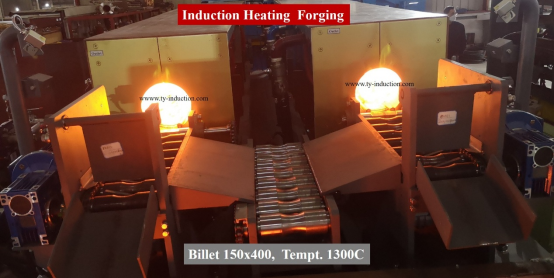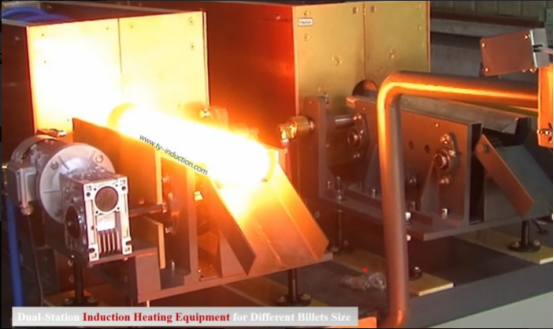Auto OEM Expands EV Motor Shaft Production with Induction Forging Line
July 30, 2025
As electric vehicles (EVs) gain popularity worldwide, automotive OEMs face increasing pressure to expand production of high-performance components, particularly EV motor shafts, which are critical to drivetrain efficiency, reliability, and power transmission.
To meet growing demand while maintaining precision, consistency, and sustainability, a leading automotive OEM expanded its production capacity by deploying a fully integrated induction forging line.. This strategic investment enables high-volume production of motor shafts with superior mechanical properties, tighter tolerances, and shorter cycle times.
The adoption of induction forging technology marks a pivotal shift in EV component manufacturing—delivering the speed, quality, and flexibility required in next-generation production environments.

EV motor shafts operate under extreme conditions, requiring exceptional performance characteristics:
· High torsional strength to handle peak motor torque
· Precision dimensional accuracy for rotor-stator alignment
· Fatigue resistance for long-term durability
· Consistent microstructure to prevent cracking or failure
Traditional forging methods—such as gas-fired heating or manual handling—often result in uneven heating, material waste, and process variability, especially when working with advanced alloys like high-strength steel, aluminum, or titanium.
Induction forging addresses these challenges by offering:
Advantage | Impact on EV Shaft Production |
Rapid, localized heating | Ensures uniform temperature distribution and consistent grain structure |
Energy efficiency | Up to 30–50% less energy vs. conventional methods |
Process control | Precise temperature regulation prevents overheating or underheating |
Automation readiness | Seamlessly integrates with robotic handling and smart manufacturing systems |
This makes induction forging the technology of choice for producing high-integrity EV drivetrain components.
Auto OEMs face multiple hurdles when expanding EV component output:
· Rising order volumes due to aggressive EV sales targets
· Material diversification across steel, aluminum, and composite alloys
· Tighter tolerances demanded by compact, high-efficiency motor designs
· Lean manufacturing goals requiring reduced cycle times, scrap, and labor costs
To overcome these, OEMs are investing in dedicated, automated induction forging lines capable of both total and partial billet heating, combined with precision forging presses.
The newly deployed line integrates advanced technologies to ensure performance, scalability, and quality control.
· Rapidly heats billets to forging temperature with ±5°C accuracy
· Ensures uniform microstructure and eliminates cold spots
· Compatible with various bar diameters and alloy types
(For Transmission & Motor Shafts)
· Fully automated forging process with programmable stroke control
· Maintains ±0.1 mm dimensional tolerances
· Reduces operator dependency and human error
· Heats the entire shaft uniformly for consistent deformation behavior
· Ideal for through-hardened shafts requiring uniform mechanical properties
· High throughput: up to 1,200 parts per hour depending on size
· Selectively heats specific zones (e.g., bearing seats, gear interfaces)
· Reduces energy consumption by up to 40% compared to full heating
· Preserves material properties in non-forged areas

Advantage | Description |
Consistent Quality | Uniform heating prevents micro-cracks and ensures mechanical integrity across batches |
High Throughput | Automated feeding, heating, and forging reduce cycle time and increase output |
Energy Efficiency | Targeted energy application lowers power consumption and operational costs |
Material Flexibility | Supports multiple alloys and geometries with minimal retooling |
Reduced Labor | Automation reduces reliance on skilled labor and minimizes human variability |
Enhanced Sustainability | Lower CO₂ emissions, reduced scrap, and alignment with ESG goals |
An international auto OEM recently upgraded its EV drivetrain facility with a complete induction forging line from TY INDUCTION. The system includes:
· Multi-zone induction heating for billet preheating
· Automated induction forging machines with closed-loop control
· Hybrid total/partial heating capability
· Real-time monitoring and data logging
Metric | Improvement |
Production Cycle Time | Reduced by 30–40% |
Scrap Rate | Decreased by over 20% |
Energy Consumption | Lowered by 35% per unit |
Alloy Flexibility | Supports high-strength steel, aluminum, and specialty alloys |
OEE (Overall Equipment Effectiveness) | Increased from 72% to 88% |
Outcome: The OEM now runs three shifts with minimal manual intervention, achieving scalable, reliable production of high-performance motor shafts.
Automation is no longer optional—it’s essential for high-volume, high-precision EV component manufacturing.
Key automation features in the new line include:
· Real-time temperature monitoring via infrared pyrometers
· Predictive maintenance using vibration and thermal sensors
· Data-driven quality control with traceability for every forged shaft
· Integration with MES/SCADA systems for centralized production management
This enables full process transparency, rapid root-cause analysis, and compliance with automotive quality standards (e.g., IATF 16949).
Trend | Impact |
Lightweight Alloys | Increased use of aluminum and titanium requires precise thermal control |
Hybrid Heating Strategies | Combining total and partial induction for optimal efficiency |
Industry 4.0 Integration | Remote monitoring, AI-based process optimization, digital twins |
Higher Automation Adoption | More OEMs deploying robotic cells and auto-forging machines |
Sustainability Focus | Demand for low-carbon, energy-efficient forging processes |
The rapid growth of the EV market is transforming how OEMs manufacture critical components like motor shafts. Induction forging has emerged as a strategic enabler—delivering the speed, precision, consistency, and sustainability needed to scale production without compromising quality.
By integrating advanced induction heating and automated forging systems, OEMs can:
· Accelerate time-to-market
· Reduce operational costs
· Improve product reliability
· Meet evolving material and performance demands
For manufacturers seeking to future-proof their EV component production, TY INDUCTION offers a complete, scalable solution portfolio:
· Induction Heating Systems for Forging
· Advanced Auto Induction Forging Machines (for transmission & motor shafts)
· Billet/Bar Induction Total Heating Equipment
· Billet/Bar Induction Partial Heating Machines
These technologies empower OEMs to achieve higher throughput, lower energy use, and superior product quality—positioning TY INDUCTION as a trusted partner in the evolution of electric mobility.
We provide end-to-end induction forging solutions tailored to the unique demands of EV drivetrain components. From concept to commissioning, our engineering team supports seamless integration, process optimization, and long-term performance.
Contact us today to upgrade your forging line for the EV era.
Hot Products
Contact Us
Enquiry hotline:
+86 135 4128 7190
Email:
Address:
No.18,14th Floor, Building 2, No. 169 Zhongli Road, Banzhuyuan Subdistrict, Xindu District, Chengdu, Sichuan, China, Code:610000
Related Products
